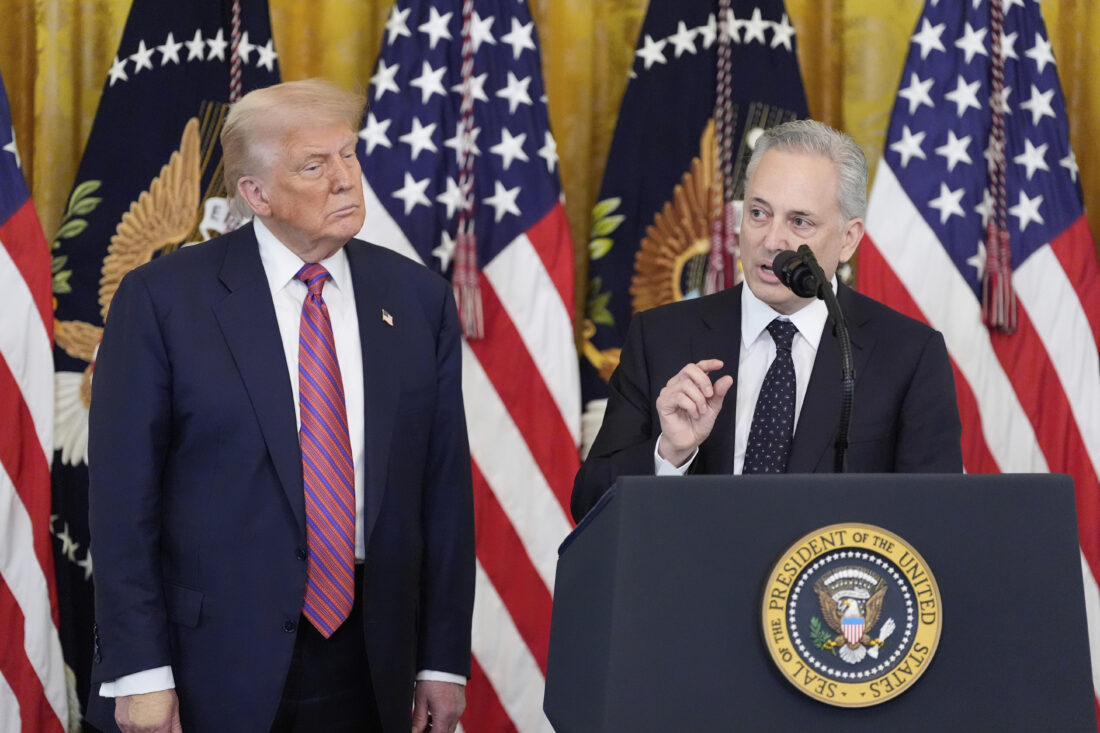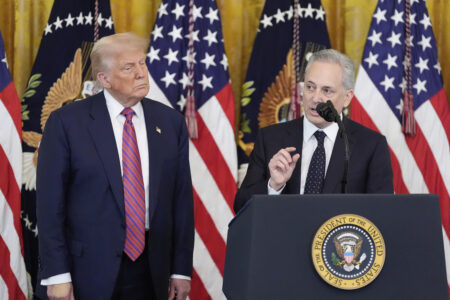Trump’s new AI plan leans heavily on Silicon Valley industry ideas

White House AI and crypto czar David Sacks speaks as President Donald Trump listens at an event for the signing of the GENIUS Act, a bill that regulates stablecoins, a type of cryptocurrency, in the East Room of the White House, Friday, in Washington. (AP Photo/Alex Brandon)
President Donald Trump has unveiled a sweeping new plan for America’s “global dominance” in artificial intelligence, proposing to cut back environmental regulations to speed up the construction of AI supercomputers while promoting the sale of U.S.-made AI technologies at home and abroad.
The “AI Action Plan” introduced Wednesday embraces many of the ideas voiced by tech industry lobbyists and the Silicon Valley investors who backed Trump’s election campaign last year. Trump, who ordered a broad AI strategy after returning to the White House in January, is also expected to sign three executive orders at an afternoon event.
The unveiling is co-hosted by the bipartisan Hill and Valley Forum and the “All-In” podcast, a business and technology show hosted by four tech investors and entrepreneurs, which includes Trump’s AI czar, David Sacks.
The plan includes some familiar tech lobby pitches. That includes accelerating the sale of AI technology abroad and making it easier to construct the energy-hungry data center buildings that are needed to form and run AI products. It also includes some of the AI culture war preoccupations of the circle of venture capitalists who endorsed Trump last year.
Trump had given his tech advisers six months to come up with new AI policies after revoking President Joe Biden’s signature AI guardrails on his first day in office.
The plan prioritizes AI innovation and adoption, urging the removal of any “red tape” that could be slowing down adoption across industries and government.
But it also seeks to guide the industry’s growth to address a longtime rallying point for the tech industry’s loudest Trump backers: countering the liberal bias they see in AI chatbots such as ChatGPT or Google’s Gemini.
Trump’s plan aims to block the government from contracting with tech companies unless they “ensure that their systems are objective and free from top-down ideological bias.” A Biden-era framework for evaluating the riskiest AI applications should also be stripped of any references to “misinformation, Diversity, Equity, and Inclusion, and climate change,” the plan said.
The plan says the nation’s leading AI models should protect free speech and be “founded on American values,” though it doesn’t define which values those should include.
Sacks, a former PayPal executive and now Trump’s top AI adviser, has been criticizing “woke AI” for more than a year, fueled by Google’s February 2024 rollout of an AI image generator that, when asked to show an American Founding Father, created pictures of Black, Asian and Native American men.
Google quickly fixed its tool, but the “Black George Washington” moment remained a parable for the problem of AI’s perceived political bias, taken up by X owner Elon Musk, venture capitalist Marc Andreessen, Vice President JD Vance and Republican lawmakers.
Chief among the plan’s goals is to speed up permitting and loosen environmental regulation to accelerate construction on new data centers and factories. It condemns “radical climate dogma” and recommends lifting a number of environmental restrictions, including clean air and water laws.
Trump has previously paired AI’s need for huge amounts of electricity with his own push to tap into U.S. energy sources, including gas, coal and nuclear.
Many tech giants are already well on their way toward building new data centers in the U.S. and around the world. OpenAI announced this week that it has switched on the first phase of a massive data center complex in Abilene, Texas, part of an Oracle-backed project known as Stargate that Trump promoted earlier this year. Amazon, Microsoft, Meta and xAI also have major projects underway.
The tech industry has pushed for easier permitting rules to get its computing facilities connected to power, but the AI building boom has also contributed to spiking demand for fossil fuel production, which contributes to global warming.
United Nations Secretary-General Antonio Guterres on Tuesday called on the world’s major tech firms to power data centers completely with renewables by 2030.
“A typical AI data center eats up as much electricity as 100,000 homes,” Guterres said. “By 2030, data centers could consume as much electricity as all of Japan does today.”




